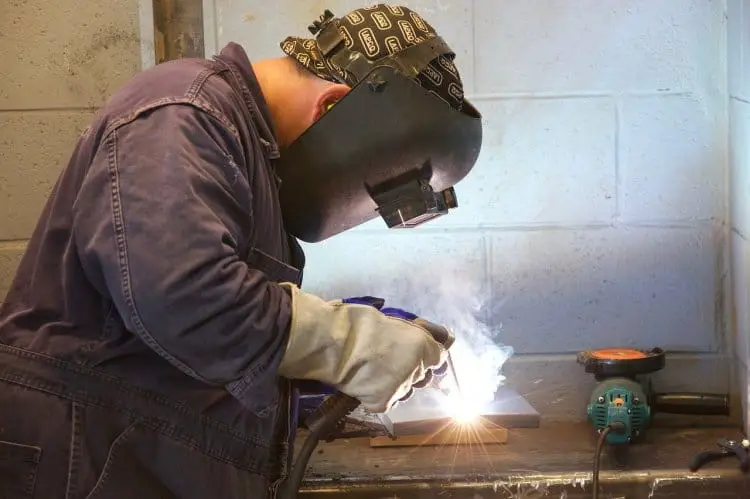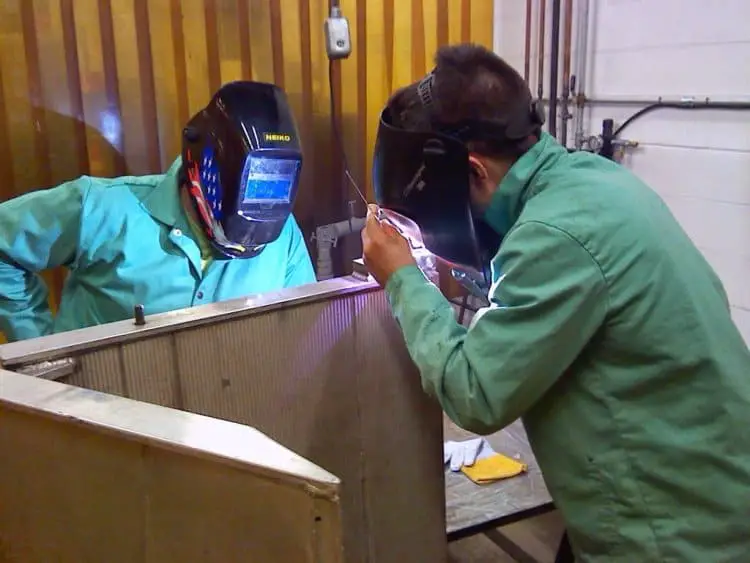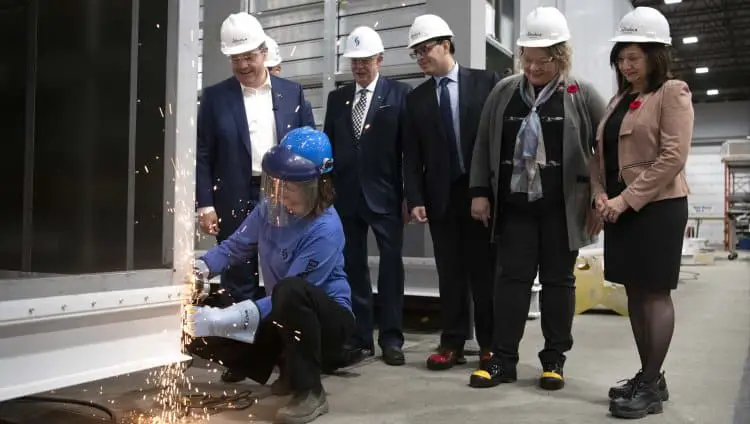This post contains affiliate links to products, services, or education. We may receive a commission for purchases made through links.
Welding apprenticeships can be an excellent way to begin a career as a welder. An apprenticeship is a big commitment and will take years to complete, but it is a unique opportunity to get paid while you learn from experienced people in the trade and gain valuable hands-on experience to help you to advance in your career.
Do welding apprenticeships pay? Yes, welding apprenticeships pay. Pay begins at an entry-level rate, and typically increases with each year of the apprenticeship. A welding apprenticeship is a multi-year commitment, and the exact amount an apprentice makes will depend on the specific apprenticeship.

There are different ways to get your foot in the door if you have an interest in welding. An apprenticeship can offer a lot of opportunities for a rewarding, well-paying career, but it also requires a strong commitment. So let’s take a closer look at welding apprenticeships.
Does Welding Have Apprenticeships?
Welding is one of many careers that offer apprenticeships. There are other routes available, and an apprenticeship is not always required, but it is one common route that people take to begin their welding careers.

A welding apprenticeship will generally last somewhere between three and five years. It is a long process that includes a lot of learning on the job by working with more experienced welders and hands-on training. The job description may consist of tasks such as reading plans, maintaining equipment, inspecting finished welds, keeping track of materials, and assisting a more experienced welder with the actual welding.
In most cases, an apprenticeship will also include some formal classroom instruction that will cover a variety of topics. Some of these topics include
- Safety standards
- Industry standards for different types of welding
- Various welding techniques
- Reading and understanding plans
- Mathematical concepts such as accurate measuring
- Scientific concepts such as electricity and the mechanical properties of different types of metals
Therefore, an apprenticeship can provide a good combination of gaining hands-on experience while also expanding your fundamental knowledge around the foundations of welding.
Apprenticeship Programs

The structure of an apprenticeship program will vary by program. Some are structured to include mostly classroom instruction for the first year and then increasing levels of hands-on training during subsequent years.
Others may include more hands-on training earlier in the program but will continue with classroom instruction for the duration of the apprenticeship. But typically, there will be more learning by doing as the apprenticeship progresses, and the apprentice becomes more familiar with welding practices.
Being an apprentice welder can be a demanding job. Not only are you performing a job, but you are also studying the concepts of welding. However, it can be a great way to gain the knowledge you need to embark on a successful career as a welder.
Here is a great video from one apprentices perspective.
How Much Does A Union Apprentice Welder Make?
As with any job, the salary of a union apprentice welder can vary greatly and will depend on factors such as the location, the company, and the type of welding.
Union Apprentice Welder Salary
For a union apprenticeship, the wages are already set through a collective bargaining agreement that the union has in place. There are pay raises set to take effect at the beginning of each year of the apprenticeship. As your skill level and experience increase, so will your pay. Although an apprenticeship is a long process that requires a lot of hard work and learning, there is plenty of opportunity for growth if you stick with it and learn as much as possible.
According to ZipRecruiter, the average yearly salary for a union apprentice welder is $31,204, with the majority falling somewhere between $29,000 and $34,000. On average, the salary for a first-year apprentice is roughly 40-50% of the salary of a journeyperson welder in that location and type of welding. And a union welder will typically make more money than a non-union welder. The exact salaries can vary greatly depending on location, company, and type of welding.
Benefits
Benefits will also vary, but many apprenticeships, and especially unions apprenticeships, will offer some benefits. These may include health insurance, paid time off, and a retirement plan.
Here is what one union benefits comparison looks like to non-union workers. This is not apprentice specific, but it gives you a good idea as to what some of the benefits are to going to a union shop.
Keep in mind, this varies from union to union and region to region, so these exact numbers or benefits packages will not apply to you. This just gives you an idea.
Next Steps
Upon completion of the apprenticeship program and passing any required testing, an apprentice is eligible to become a journeyperson, and this will typically come with another pay raise. Becoming a journeyperson welder means that you are certified to work without the direct supervision and guidance of a more experienced welder.
At this point, your formal apprenticeship training will be complete, but the learning process never ends, and you may want to pursue other specific certifications. And it’s always a good idea to practice your skills and learn new skills, as this will help your earning potential throughout your career.
How Do I Start A Welding Apprenticeship?
Some apprenticeships are offered directly through a welding company, while others are offered through a union. In some cases, state agencies sponsor apprenticeships in their state, or there could be a combination of these organizations working together to offer apprenticeships. So there are a few different ways that you can approach a search for apprentice welder opportunities.
- A good general place to start your search and gather information is the Department of Labor’s website for apprenticeships. You can search for apprenticeship opportunities in your area, and there is also a lot of information on apprenticeships, education, and job data. There is also information about programs that support diversity and inclusion, as well as specific information for service members and veterans interested in apprenticeships.
- Another option is a job search site such as Indeed or ZipRecruiter. This is a quick and easy way to find apprenticeship opportunities in your area. You can also get a better idea of what will be expected of an apprentice welder by reading job descriptions.
- You can also contact a local welders union to find out about opportunities they might have and acquire more information about the apprenticeship process and the industry.
There are many things to think about when considering beginning a welding apprenticeship. Some of these are:
- Familiarize yourself with the basics of welding and what will be expected of you
- Make sure you are physically fit enough to become a welder, as it can be a physically demanding job
- Consider if there is a certain type of welding that interests you the most.
Some common types of welding are
- MIG, TIG, Arc, and Oxy-Acetylene welding.
Each of these types has its pros and cons. MIG welding is one of the easier types to learn and is usually a good place to start, while TIG welding is more complicated. The more types of welding that you can become proficient at, the more desirable you will be to potential employers, but it is a good idea to explore what interests you and where might be the best place to start.
Final Thoughts
Welding is a growing profession, and it can be a rewarding career. Apprenticeships can be a great way to get paid while you are learning the trade. There is so much to learn about welding, that even after an extensive apprenticeship, there will still be more to learn, but an apprenticeship can be a great way to start a career.
